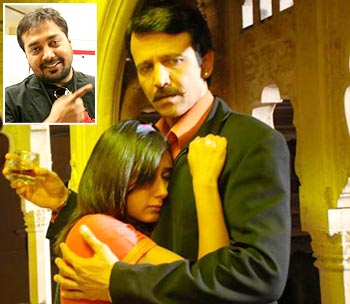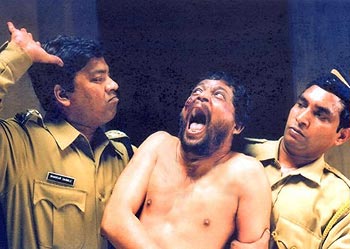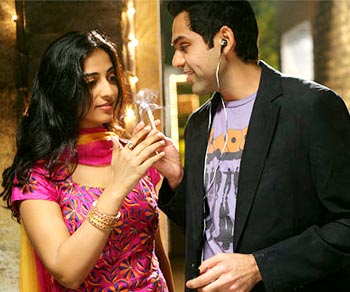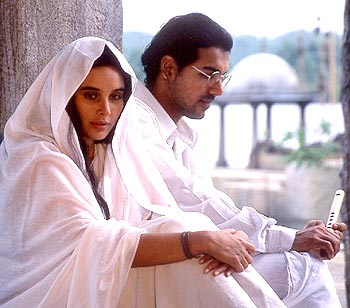 | « Back to article | Print this article |
'Filmmaking is often an organic and natural process'
Anurag Kashyap, who brings his Gulaal to the Mahindra Indo-American Arts Council (MIACC) film festival in New York, is arguably the most envied filmmaker in India and an inspiration for aspiring filmmakers who flock the festival looking for career advice. With an unheard of three-year, nine-film deal -- of which he will direct four while producing the rest with new directors signed with UTV -- Kashyap is positioned as one of the most watched directors in Bollywood today.
Kashyap is also working with a Princeton University professor on a movie project set in Mumbai that could have Danny Boyle (Slumdog Millionaire) as producer.
A certain degree of practicality, he says, is essential to success. "I wrote the dialogue and scripts for all kinds of films -- and I did so with earnestness -- because I wanted to do my own kind of films which were not in an easy position to get the funding," he says. "But now onwards, I am not going to write dialogue for films made by someone else, unless there is a compelling reason to do so. Writing dialogue for someone else means serving a different vision or an artistic aims other than my own."
Kashyap, 38, loves making taut and brisk films which offer social and political commentary. Dev D, his biggest hit as a director, was a refreshingly engaging retelling of the Devdas legend. Gulaal, which followed, is set in Rajasthan and revolves around a group of people who want to set up their own state, one that will fulfill their narrow, even fascistic, vision. Though it didn't enjoy the success of Dev D, Kashyap believes Gulaal is the more important film.
Anurag Kashyap, now firmly installed in the A-list of Bollywood directors, discusses his craft with Arthur J Pais.
Gulaal received good reviews but wasn't a success.
I consider Gulaal more important than Dev D. Unfortunately, it came out around the time people were not going to the movies. The film industry strike contributed to its short run. The film needed a longer nurturing period to find the audiences. It has, however, taken on a life of its own. It has been widely seen outside the theatres. Personally, the film is very important to me. It is a much bigger film than Dev D.
I began working on the film in 2001, when I was very upset over the way things were going in the country and in the film industry. I have shot parts of the film over the years, with many cast members remaining. Antara Mali, who was to play the lead, dropped out of the industry and had to be replaced. I felt there was too much of emphasis in India on caste, regionalism, and materialism than on people.
'I got the consolation and courage partly by watching Guru Dutt's Pyaasa'
Your Black Friday was banned in some parts of India; Gulaal was not very well-received. How did you keep the faith?
I got the consolation and courage partly by watching Guru Dutt's Pyaasa (which is about a struggling artist) and listening to Sahir Ludhianvi's songs in that movie.
Who is working on the script of your Bombay project?
There are several writers. I will not direct a film if I have not written the script. We are working hard to create the script. One of the persons is Professor Gyan Prakash, who teaches history at Princeton. He is a big star in American academia, and he is very knowledgeable about Indian cinema. He talked with me about a Bombay-based story several years ago; he was writing a book on the city, and the story he told me started taking a life of its own.
The film evokes a city just the way films like LA Confidential evoked Los Angeles. Gyan had seen my films before I met him in New York several years ago, and he liked my first directorial venture Paanch very much.
'Making Dev D was one of the most satisfying experiences in my career'
Your deal with UTV is unprecedented. How did that come about?
Making Dev D was one of the most satisfying experiences in my career. I had the best encouragement in every aspect. And there was freedom.
UTV also did a great job distributing the film, giving it maximum exposure in the multiplexes. I am looking forward to reliving that experience many times over. The films will be made over a period of three years.
I will direct only four films; the others, I hope, will be directed by newcomers. We will be making films with a variety of subjects. We have, for example, signed Mukul Abhyankar to direct a comedy called Ram Lila. It takes place in a small town in contemporary India where people caught in funny and unexpected situations make all kinds of mistakes, but they also learn from them. And like good comedies, it has also social undercurrents.
How does a new director go about gaining your approval?
It needs a first rate script that he or she has written. The director in that case is very close to the subject. He or she is involved in the film right from the start. And then there is also passion and commitment from the start.
'The Girl in Yellow Boots is a thriller'
Over time, you have written dialogue for more than two dozen films (including Deepa Mehta's Water, in the picture), directed six movies, and also appeared in small parts in half dozen films. How do you make time for all this?
I think of films all the time. That is why some people find me boring. There is hardly anything to talk about with me except films.
How do you get ready to start a film?
Filmmaking is often an organic and natural process. I may have several scripts, but one of them demands more attention, and I am ready to make a film in no time. The Girl in Yellow Boots that I am making now, for instance, is a thriller. I was away for several weeks attending film festivals abroad and showing Gulaal. Then I came back to Mumbai and said to myself, why not start making this film. Kalki Koechlin (his real life companion) plays the British girl visiting India, and she co-wrote the movie.
When your main passion is cinema, and you have a band of artists you work with in film after film, and your budget is not big, you can start a film any time and complete it in a few months.



